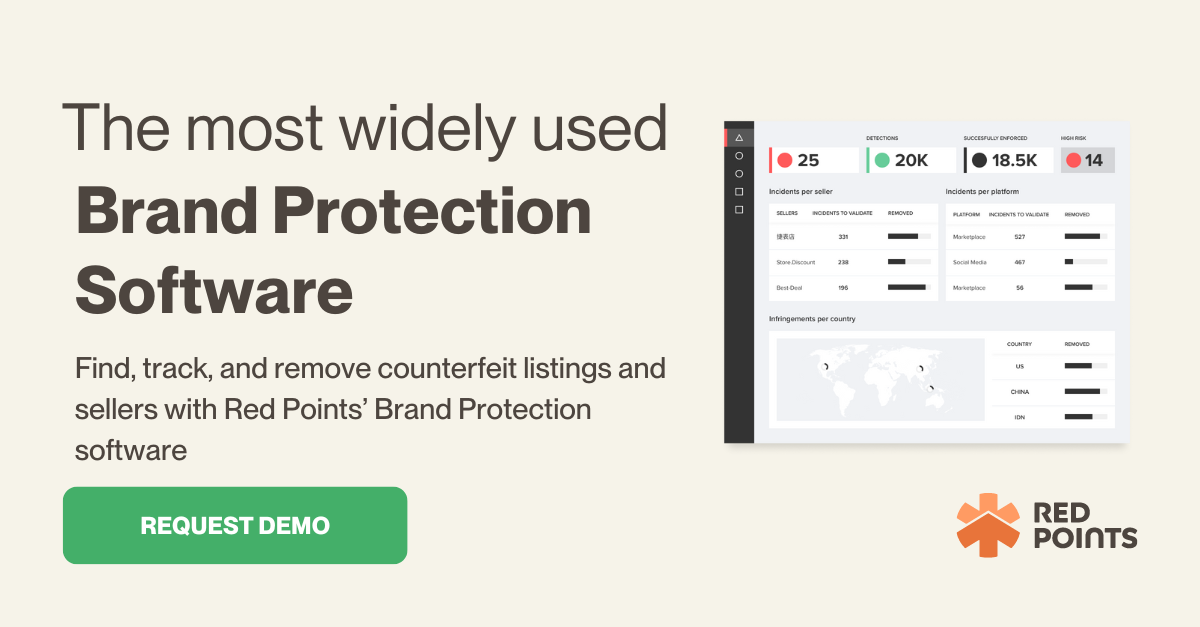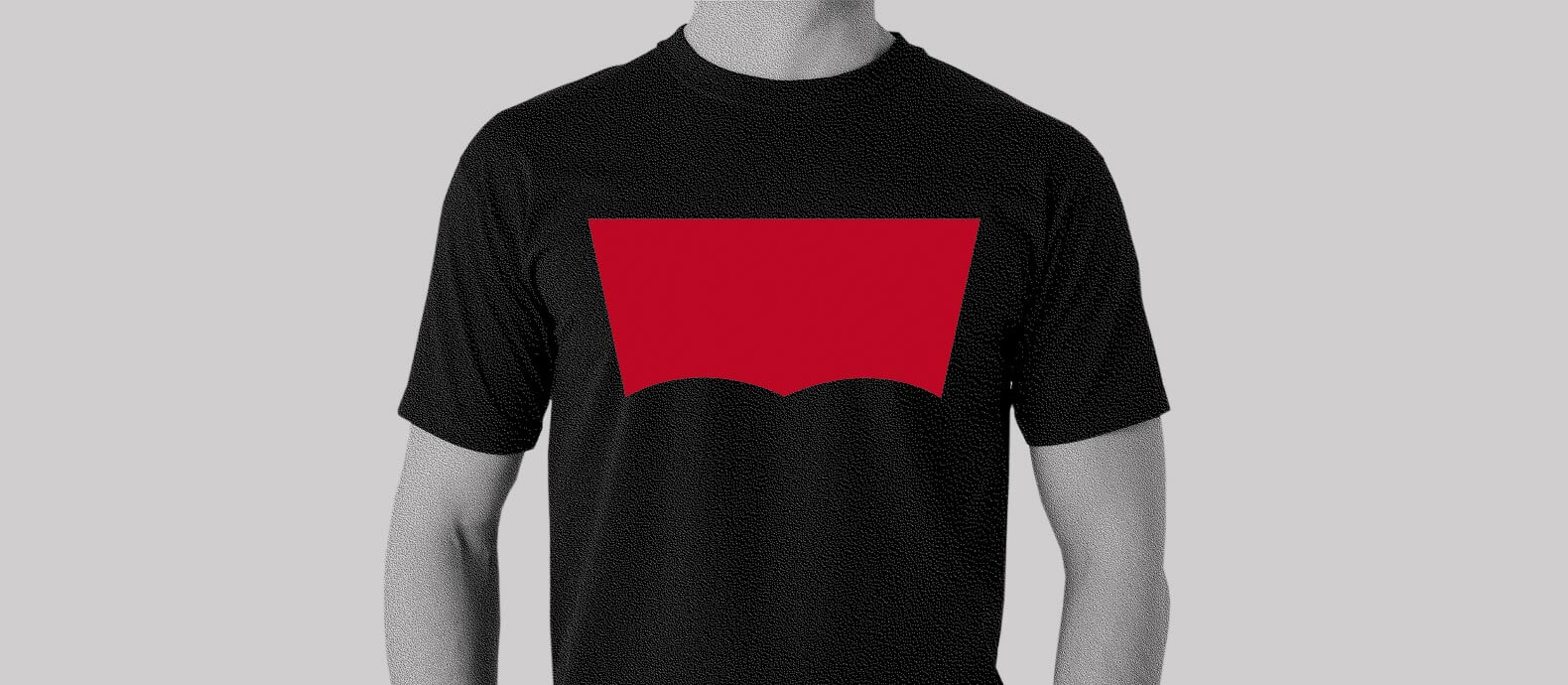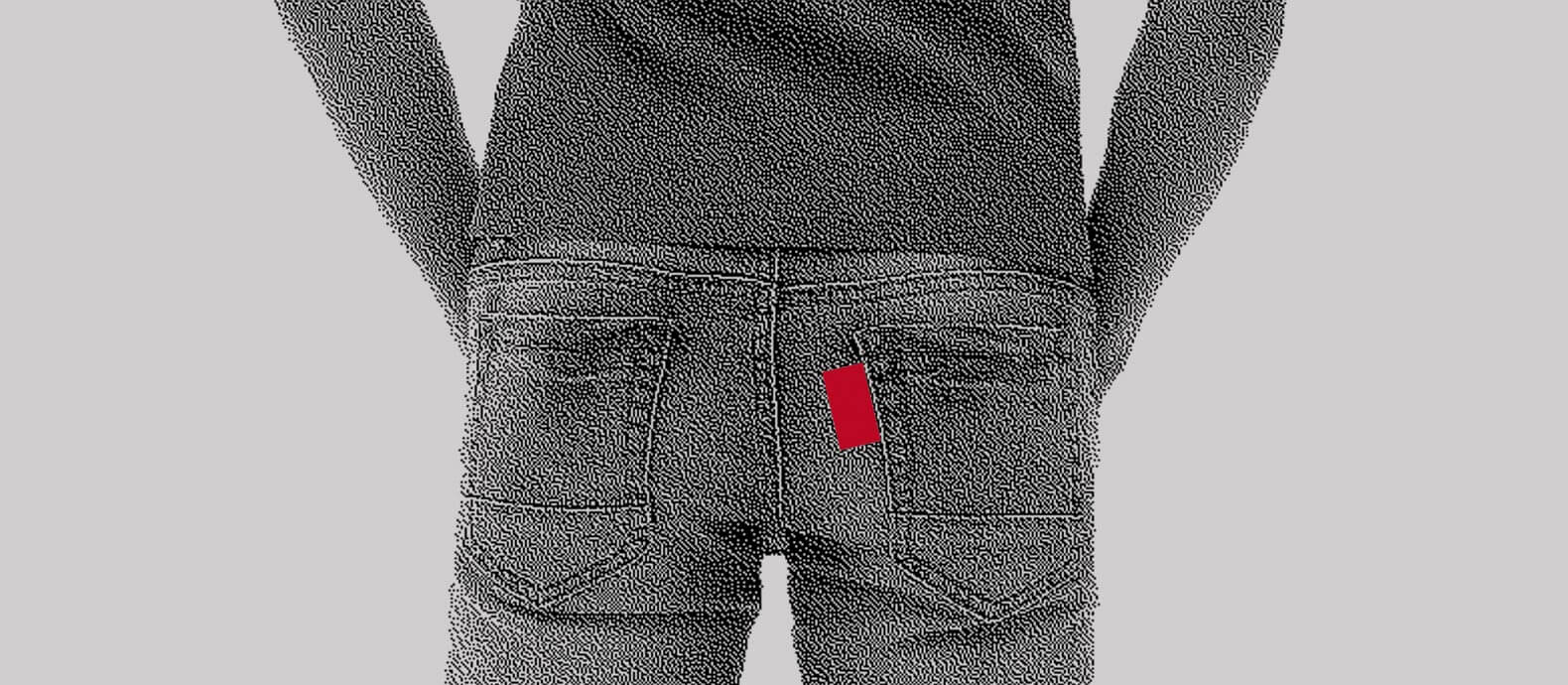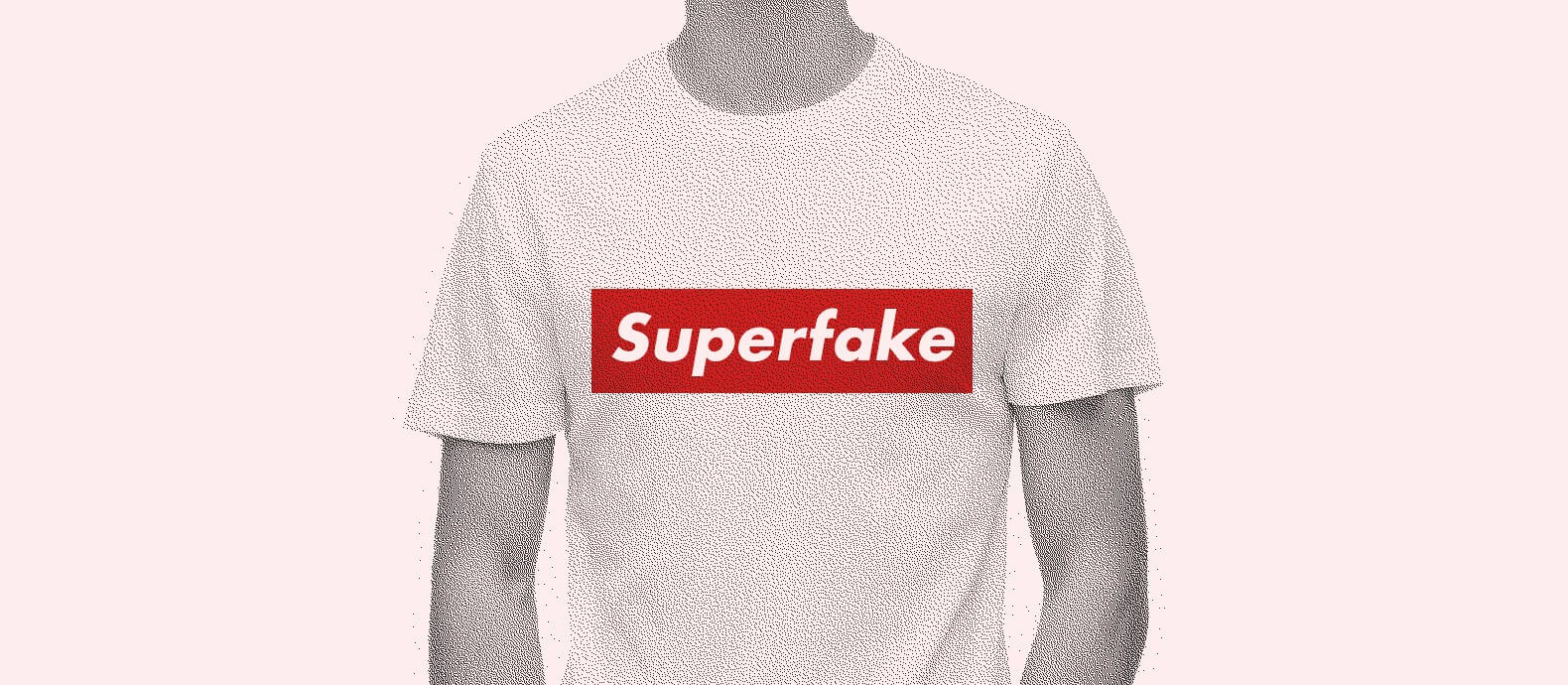Even top fashion designers know that a unique t-shirt design can set your brand apart and captivate your audience. It can also help more shoppers discover your brand online thanks to viral marketing. However, the digital landscape also presents challenges, such as the risk of design replication and copyright infringement. In this comprehensive guide, we delve into the best strategies for safeguarding your creative designs, navigating copyright laws, and ensuring your t-shirt business thrives in a competitive marketplace.
In this article, we discuss:
- How to avoid copyright infringement with t-shirts?
- What can you use for your t-shirt designs to avoid copyright infringement?
- How to copyright a design for t-shirts?
- Why you should apply for both copyrights and trademarks?
- How Red Points can help protect your business?

How to avoid copyright infringement with t-shirts?
The first step of copyrighting your t-shirt designs is to ensure that you aren’t infringing on anyone else’s copyright.
While there is nothing wrong with being inspired by others, you cannot directly use other copyrighted elements and artworks without the prior permission of the owner as it can quickly land you in troubled waters.
Here are the elements that you shouldn’t use without prior permission of the owner to avoid copyright infringements.
- Logos: Whether the logo is from a brand, a game, a book, a sports club, a school, a college, or an organization, you can’t use them in your t-shirt designs
- Artwork from other people: This includes artwork you see in a book, a movie, or a comic book.
- Character pictures: This can include character pictures from books, movies, television shows, and comics. Note that you also cannot sell derivative artworks made of copyrighted characters. That means you cannot draw a Mickey Mouse design by yourself and put it on your t-shirt to sell it for profit. Derivative artworks are also considered copyright infringement.
- Memes: Yes, you can even infringe on someone’s copyright by using popular memes on your t-shirt designs. If you are just sharing the meme for fun on your social media profile, it isn’t much of an issue. The problem occurs when you start using that meme for commercial purposes — like designing a new t-shirt and selling it for profit. When and if this gets the attention of the copyright owner of the original meme image/video, they could send a cease and desist or claim their damages too.
- Images: The internet may be full of images, but that doesn’t mean you can just use any image you find online. Most of the images that you see online are copyrighted, and using them without the permission of the owner can lead to copyright infringement. This also includes images of celebrities.
- Trademarked content: You cannot use any other trademark content like logos, brand names, brand colors, and phrases.
What can you use for your t-shirt designs to avoid copyright infringement?
Flags and national symbols
To start with, you are free to use flags, national symbols, and even coats of arms on your t-shirt designs. That is because these types of images are not protected by any trademark or copyright and you won’t get sued for it. However, keep a note that you can’t use any artwork that uses flags and national symbols as that artwork itself might be copyrighted.
Public domain
There is an entire collection of creative work to which rules of exclusive intellectual property do not apply called the public domain.
Copyrighted work isn’t protected forever. The exclusivity of copyright only lasts about 50-70 years after the death of the author (The exact length can differ according to local jurisdiction).
According to the copyright laws of the US, any work that was created after January 1, 1978, is copyrighted for the life of the author who created the work plus 70 years after their death.
After the copyright period expires, the work comes under the public domain and it is free to be used.
It is also important to note that the public domain isn’t just filled with old works of authors that passed away a long time ago. There are a lot of creators who willingly put their work under the public domain.
Creative Commons
Creative Commons is a non-profit to increase the total number of creatives available for using, building, and sharing legally. The licenses under Creative Commons allow creators to specify the rights to their work.
While some works in Creative Commons allow you to use them for commercial purposes, others don’t.
Here are the different types of Creative Commons licenses:
- CC0: This license means that the creator has given up the copyright to their work and it is now a part of the public domain. You can reuse the work in any form, without worrying about any clauses or conditions
- CC BY: This allows people to reuse the content even for commercial purposes, as long as you give credit to the original creator
- CC BY-SA: Similar to CC BY, this license adds another clause that the person who reuses the work should license their new creation the same as the original work
- CC BY-NC: Also similar to BY license, this one comes with the added clause that the work you create can only be used for noncommercial purposes
- CC BY-NC-SA: This means that the person can use the works but they have to license their new creation under the same terms as the original
- CC BY-ND: This license means you can copy and distribute the work for commercial use, but you cannot make any changes to the work. You also need to give credit to the original author
- CC BY-NC-ND: This is almost the same as the BY-ND above, except you can only copy and distribute the work for non-commercial purposes.
It is important to note that Creative Commons licenses aren’t a replacement for copyright law. They just offer flexibility to creators and artists to easily specify the type of copyright they want to add to their work.
Parodies
Also important to know that the Copyright Act has a few exceptions where you can use copyrighted material without the consent of the author, and this includes parodies and satire. So the new t-shirt design you create must ridicule or make fun of the original copyrighted work in some way. The parody should also have very clear differences from the original work.
Why copyright your t-shirt design?
There are many benefits to copyrighting t-shirt designs, including:
- Seamless legal protection: When you don’t have a copyright for your t-shirt designs, anybody can directly copy your designs, sell them as their own, and profit from them. But when you copyright your t-shirt designs, you can file a case against the unauthorized use of your designs and get the fake product listings taken down without it affecting your brand reputation or revenue.
- Set your products apart: With your designs copyrighted, no one else can duplicate them in any way, which allows you to set your t-shirts apart from all of your competitors. Your customers will uniquely identify your t-shirt with your business which can in turn help improve brand recognition and awareness.
- Brand protection: When you have a small and growing business, it can take a lot of time, money, and effort to steadily build your brand reputation and establish customer loyalty. Without copyright protection, someone else can take advantage of your brand’s success by passing off your products as their own. Copyright keeps your grounds covered and ensures that even if someone tries to replicate your designs, you can take strict legal action against them.
How to copyright a design for t-shirts
The exact fees and process for copyright registration can differ according to the country you are located in. However, if you are filing for copyright in a country that is part of the Berne Convention, then your copyright protection will stay valid in over 180 countries with just a single filing.
If you are filing for copyright in the US, the registration fee will be between $35-55, depending on the case. Here’s how you can copyright your t-shirt designs.
1- Go to the US Copyright Office website and select Register a Copyright
2- Next, choose the Visual Arts category
3- Create an account by entering the relevant details. You will also have to upload a copy of the design for their records
4- Fill out the application and pay the fee
5- Apply online or mail the application to the copyright office
It takes around 3-11 months for online applications to get processed. Mail applications can take up to two years to process.
What’s the difference between trademark and copyright for your t-shirt?
While copyright allows you to protect your unique designs and creations, trademark helps protect your brand name, logo, colors, and even phrases.
Also, while you can trademark phrases and slogans, it doesn’t mean that you can trademark just about any slogan you want. A quote can only be trademarked if it’s a part of your brand’s name or a part of the slogan for your products.
For instance, almost every clothing brand has some version of the basic black t-shirt, but only Nike can create black t-shirts with their trademark ‘swoosh’ logo on the t-shirts. Similarly, Nike has also trademarked their slogan ‘Just do it.’ That means no one else can use this phrase on their clothing, without prior permission from Nike.
What if someone infringes on your t-shirt designs?
Given the prominence of platforms like Amazon, Etsy, and others in selling t-shirt designs, it’s important to understand their specific policies regarding copyright infringement and how they facilitate or complicate the enforcement of copyright. Brands should understand how to navigate these platforms’ reporting systems and collaborate with them to protect their designs.
Send a legal notice to infringers: When you find someone copying your t-shirt designs and infringing on your copyright, you can directly reach out to them and send them a legal notice in the form of a cease and desist letter. You should make sure to inform the infringers that if they don’t take down the counterfeit listings of your products, you will be forced to take strict action against them.
Take down counterfeit listings yourself: There can be times when you reach out to fake sellers and they don’t respond to you. In cases like that, you can report the counterfeit product listings to the relevant marketplace platforms and take them down by proving that you own the copyright to the designs. You can follow the Red Points’ how-to guides to take down counterfeit listings on Amazon, eBay, Alibaba, and other platforms.
Take steps to protect your brand: While you need to take action when someone infringes on your copyright, you also need to proactively protect your brand by taking down fake listings as soon as they show up. After all, the longer the fake listings stay active, the more they can affect your business revenue and reputation.
Leveraging technology for copyright enforcement
The good news is, tracking potential copyright infringements doesn’t have to be done manually. Thanks to advancements in technology, monitoring and protecting copyrighted designs can be simplified by software and services that specialize in scanning the web for copyright infringements and unauthorized use of designs. These tools can be integrated into your brand protection strategy to automate the detection and takedown process.
Google Reverse Image Search is a free tool that allows you to upload an image of your t-shirt design, and Google will search for visually similar images across the web. It’s a quick and easy way to spot potential infringements but might not catch everything.
Specializing in online brand protection, Red Points uses AI to help you find, track, and remove fake product listings, across the internet, including e-commerce platforms, social media, and websites, automatically. Its Brand Protection Software uses advanced intelligence tools to detect infringements 24/7 and take them down automatically.
What’s next
Even if you are in the early stages of your business, you should start filing relevant copyrights, trademarks, and patents. The only way to protect your business is to protect your intellectual property effectively.
Once you have registered your copyrights and trademarks, you might still come across counterfeit versions of your t-shirt designs. If you are facing such challenges, we suggest you book a free consultation with us to learn about how our software can help. Our platform is specifically designed to automatically detect and report counterfeit items, making the process simple for you and giving you peace of mind that your creative designs are secured.






